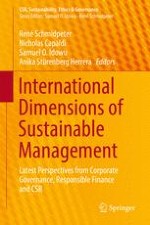
2019 | OriginalPaper | Buchkapitel
Homo sapiens’ Relationship to Earth: Preservation Versus Plunder
verfasst von : Paul McDonald
Erschienen in: International Dimensions of Sustainable Management
Verlag: Springer International Publishing
Aktivieren Sie unsere intelligente Suche, um passende Fachinhalte oder Patente zu finden.
Wählen Sie Textabschnitte aus um mit Künstlicher Intelligenz passenden Patente zu finden. powered by
Markieren Sie Textabschnitte, um KI-gestützt weitere passende Inhalte zu finden. powered by